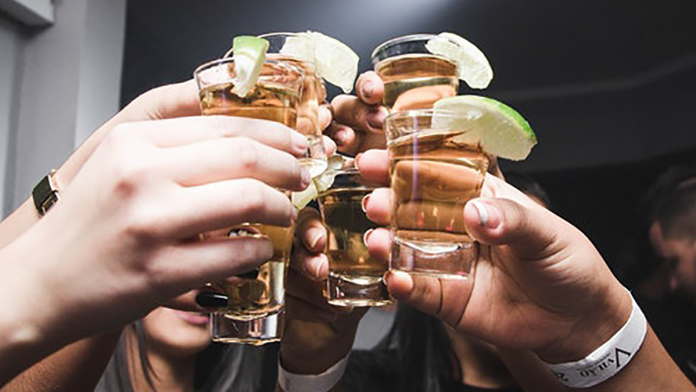Dry January, one of several challenges that aims to improve health, has become more and more popular in recent years and is now arguably known in nearly every British household. Much like Veganuary, a month of vegan eating, and Red January, where people exercise and raise money for the mental health charity Mind, the challenge aims to help people set goals that are perhaps more realistic than famously hard-to-keep new year’s resolutions such as ‘eating better’ or ‘getting fit’. With alcohol misuse the biggest risk factor for death and illness amongst under fifties in the UK and the fifth biggest risk factor across all ages, encouraging people to be mindful about their alcohol consumption can be no bad thing.
The first Dry January campaign was launched in 2013 by the charity Alcohol Change UK with backing from celebrities such as Alastair Campbell who shared details about his own journey to sobriety. The campaign’s aim was simple: encourage as many people as possible to take a month off drinking and let them see the benefits for themselves. Since then, the campaign has arguably sparked a real shift in attitudes in the UK, with beer manufacturers now producing trendy alcohol free alternatives and ITV’s This Morning dedicating timeslots to discuss the best mocktails on the market.
In December 2020, 6.5 million British people aimed to take part in the challenge and start off 2021 with a health kick. The challenge has even spread as far as the US; fifteen per cent of those who consume alcohol planned to take part in the 2021 challenge. Even before Dry January 2022 has started, Britain’s first alcohol-free off-licence will open as a pop-up in London’s West End for Christmas 2021 as shoppers look for alternative tipples for the festive season.
Why is it such a challenge for many?
Those behind the campaign, which is also now backed by Public Health England and the NHS, say participants will notice clearer skin, better sleep and increased energy. However, some say despite the initial benefits, just one month without booze can’t really make a big difference and argue that total sobriety is unrealistic for most in today’s society. After all, traditions of drinking alcohol are well and truly entrenched in our societal norms.
Even during the pandemic, despite not being able to go to the pub to meet with friends, many people continued to take comfort in a glass of wine at home. Having a drink isn’t just about having fun with friends. We also use alcohol to commiserate and to cope with stress – in good and bad times, we often turn to something stronger to mark an occasion or ease tension.
But this is nothing new. People have been drinking alcohol for literally ages– the ancient Egyptians produced beer and wine and allotted the thirsty builders of the Giza pyramid a daily allowance of more than a gallon of beer. Given that alcohol is part of our past and very much part of our present -despite few workplaces offering a beer allowance- it’s no wonder that socialising sober is tricky, even just for one month.
Post-Christmas is perhaps the perfect time to examine our relationship with alcohol; a time when letting your hair down means indulging in a glass of sherry and the mainstay of the New Year’s Eve celebrations is clinking champagne glasses. Even the Christmas pudding doesn’t escape a dousing of brandy.
The normalisation of drinking alcohol isn´t just limited to Christmas. It’s hard to think of any special occasion that doesn’t traditionally involve some sort of tipple, from wetting the baby’s head at a christening to the toast at a wake- it seems alcohol accompanies us throughout our lives. However, even if we wish to have a drink in hand while both celebrating and commiserating, does it always have to be alcoholic?
The popularisation of the Dry January campaign has certainly shifted the conversation when it comes to when, why and how much we drink. This has doubtless also encouraged conversations between friends and family that may otherwise have been difficult to start. As well as supporting the idea that we individually examine our personal relationship with alcohol, opening up a conversation about alcohol’s place in our celebrations and traditions is a great positive of the Dry January campaign.

What is ‘mindful drinking’?
After all of the treats we enjoy at Christmas, a few glasses of wine here and a mince pie there, setting yourself the challenge to give something up can be a great test of willpower. However, getting overly focused on solely achieving the goal – being exactly thirty one days alcohol free – may do more harm than good, if doing so gives you the green light to overindulge in ‘binge February’ as you’ve been “good” since 1st January.
While it’s certainly true that giving up alcohol for a month does your body good, it certainly doesn’t justify spending the rest of the year in excess. In fact, the aim of the Dry January campaign is much more about assessing how alcohol fits into our lives, examining that relationship and making some positive and beneficial choices about drinking. As the campaign slogan for 2021 puts it, “It isn’t about giving anything up. It’s about getting something back”. That being energy, better health and a more positive and considered approach towards drinking.
The outcomes of Dry January vary from person to person but are overwhelmingly positive, with seventy per cent of participants continuing to drink less than before in July of the same year they participated. Having a healthier attitude towards drinking doesn’t have to mean cutting out drinking all together, especially if you are able to maintain a sound, healthy balance when it comes to alcohol.
Certainly, having a greater awareness of why we drink and what effect it has on us is no bad thing. For instance, realising after some reflection that your choice of a glass of wine post-work is much more about relaxing than appreciating the drink itself may well prompt you to consider replacing it with a healthier alternative that also helps you to relax. Yoga, meditation or a brisk walk in the fresh air are all good suggestions but perhaps having a cup of tea and a biscuit, taking a bath or watching an episode of your favourite soap opera may be more realistic, positive changes for some.
Reassessing your relationship with alcohol could also mean deciding to drink mindfully, not just because everyone else is. Selecting a wine from the supermarket that perfectly accompanies the meal you plan to cook this weekend is mindful, deliberate and can be enjoyable. In contrast, being talked into sharing a bottle with friends at after-work drinks when you otherwise might not have had a drink is a common way that, unconsciously, your consumption can creep up.
Why January 2022?
January may not seem the ideal moment to make drastic changes outside of your comfort zone. It’s dark, dreary and if you´ve over indulged at Christmas, you’re likely feeling pretty sluggish and possibly strapped for cash. Despite this, all of the adverts on TV are already telling you to join a gym, eat better and to start saving and slimming for summer. However, in the spirit of New Year’s optimism, when we form resolutions and try to drop bad habits, a fresh, alcohol-free start to the year can be a great motivation for many. There is the added bonus that the size of the campaign likely means you won’t be alone amongst work colleagues, family and friends in giving Dry January a go. For those who have been curious about reducing their alcohol intake, it also offers a fantastic chance to practise with support from all sides.
Becoming more creative and purposeful about how you spend your time is also a crucial element of the challenge.
How else can I spend my Saturday night if not in a bar with friends? Or, can I still enjoy the bar with friends without a few glasses of wine?
Some argue that the reduction in socialising after Christmas with fewer parties and meet-ups makes the challenge too easy. Is it really a good test if you’re not being tempted? From another perspective, fewer social events may actually allow people an easier entry into this type of lifestyle change as they are less likely to slip into familiar patterns when the parties are over.
Others have asked whether a global pandemic is really the time for abstinence. A time of bereavement and uncertainty could hardly be argued to be the optimal moment to give up something that many of us find comforting. The health benefits, however, shout the contrary. There couldn’t be a better time to make positive changes for our physical and mental health than now. Challenging ourselves to reduce our alcohol intake also means promising ourselves better sleep, better health and perhaps better relationships.
Out of necessity, lockdown has inspired many of us to become more creative in the way we spend time in our homes from cocktail making to banana bread baking, not forgetting Zoom quizzes as a few of the new alternative Saturday night plans. If we can socialise through a screen, is it so hard to imagine meeting a friend for a walk and a coffee instead of the usual pint?
Alcohol Change UK offer a wide range of resources and support for all people regardless of their level of alcohol use, including a quiz to assess the effects of alcohol on your life. Reducing a high alcohol intake suddenly may have serious complications for your health so it is vital to seek advice if you feel that your consumption is problematic.
If you are considering joining in with 2022’s Dry January campaign, Professor Kevin Moore, one of Europe’s leading alcoholic liver specialists, expertly explains the benefits of an alcohol-free month in his inspiring article. If you are concerned about your alcohol intake, you can consult a specialist through Top Doctors.








Join the discussion